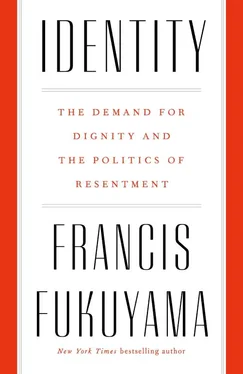Being a citizen of a liberal democracy does not mean, moreover, that people will actually be treated with equal respect either by their government or by other citizens. They are judged on the basis of their skin color, their gender, their national origin, their looks, their ethnicity, or their sexual orientation. Each person and each group experiences disrespect in different ways, and each seeks its own dignity. Identity politics thus engenders its own dynamic, by which societies divide themselves into smaller and smaller groups by virtue of their particular “lived experience” of victimization.
Confusion over identity arises as a condition of living in the modern world. Modernization means constant change and disruption, and the opening up of choices that did not exist before. It is mobile, fluid, and complex. This fluidity is by and large a good thing: over generations, millions of people have been fleeing villages and traditional societies that do not offer them choices, in favor of ones that do.
But the freedom and degree of choice that exist in a modern liberal society can also leave people unhappy and disconnected from their fellow human beings. They find themselves nostalgic for the community and structured life they think they have lost, or that their ancestors supposedly once possessed. The authentic identities they are seeking are ones that bind them to other people. They can be seduced by leaders who tell them that they have been betrayed and disrespected by the existing power structures, and that they are members of important communities whose greatness will again be recognized.
Many modern liberal democracies find themselves at the cusp of an important choice. They have had to accommodate rapid economic and social change and have become far more diverse as a result of globalization. This has created demands for recognition on the part of groups who were previously invisible to the mainstream society. But this has entailed a perceived lowering of the status of the groups they have displaced, leading to a politics of resentment and backlash. The retreat on both sides into ever narrower identities threatens the possibility of deliberation and collective action by the society as a whole. Down this road lies, ultimately, state breakdown and failure.
The nature of modern identity is to be changeable, however. While some individuals may persuade themselves that their identity is based on their biology and is outside their control, the condition of modernity is to have multiple identities, ones that are shaped by our social interactions on any number of levels. We have identities defined by our race, gender, workplace, education, affinities, and nation. For many teenagers, identity forms around the specific subgenre of music that they and their friends listen to.
But if the logic of identity politics is to divide societies into ever smaller, self-regarding groups, it is also possible to create identities that are broader and more integrative. One does not have to deny the potentialities and lived experiences of individuals to recognize that they can also share values and aspirations with much broader circles of citizens. Erlebnis can aggregate into Erfahrung ; lived experience can become just plain experience. So while we will never get away from identity politics in the modern world, we can steer it back to broader forms of mutual respect for dignity that will make democracy more functional.
How do we translate these abstract ideas into concrete policies at the current moment? We can start by trying to counter the specific abuses that have driven assertions of identity, such as unwarranted police violence against minorities or sexual assault and sexual harrassment in workplaces, schools, and other institutions. No critique of identity politics should imply that these are not real and urgent problems that need concrete solutions.
Beyond that, there is a larger agenda of integrating smaller groups into larger wholes on which trust and citizenship can be based. We need to promote creedal national identities built around the foundational ideas of modern liberal democracy, and use public policies to deliberately assimilate newcomers to those identities. Liberal democracy has its own culture, which must be held in higher esteem than cultures rejecting democracy’s values.
Over recent decades, the European left had come to support a form of multiculturalism that downplayed the importance of integrating immigrants into the national culture. Under the banner of antiracism it looked the other way from evidence that assimilation wasn’t working. The new populist right, for its part, looks back nostalgically at a fading national culture that was based on ethnicity or religion, a culture that was largely free of immigrants or significant diversities.
In the United States, identity politics has fractured the left into a series of identity groups that are home to its most energetic political activists. It has in many respects lost touch with the one identity group that used to be its largest constituency, the white working class. This has spawned the rise of a populist right that feels its own identity to be under threat, abetted by a president whose personal vanity is tied to the degree of anger and polarization he can stoke.
The European agenda must start with redefinitions of national identity embodied in its citizenship laws. Ideally, the EU should create a single citizenship whose requirements would be based on adherence to basic liberal democratic principles, one that would supersede national citizenship laws. This has not been politically possible in the past, and it is much less thinkable now with the rise of populist parties across the Continent. It would help if the EU democratized itself by shifting powers from the Commission to the Parliament and tried to make up for lost time by investing in European identity through the creation of the appropriate symbols and narratives that would be inculcated through a common educational system. This too is likely to be beyond the capability of a union of twenty-eight members, each of which remains jealous of its national prerogatives and stands ready to veto such a program. Any action that takes place will therefore have to happen, for better or worse, on a member-state level.
Those laws of EU member states still based on jus sanguinis need to be changed to jus soli so as not to privilege one ethnic group over another. It is perfectly legitimate to impose stringent requirements for the naturalization of new citizens, something the United States has done for many years. In the United States, in addition to proving continuous residency in the country for five years, new citizens are expected to be able to read, write, and speak basic English, to have an understanding of U.S. history and government, to be of good moral character (i.e., no criminal record), and to demonstrate an attachment to the principles and ideals of the U.S. Constitution. The latter is undertaken by swearing the naturalization oath of allegiance to the United States of America:
I hereby declare, on oath, that I absolutely and entirely renounce and abjure all allegiance and fidelity to any foreign prince, potentate, state, or sovereignty, of whom or which I have heretofore been a subject or citizen; that I will support and defend the Constitution and laws of the United States of America against all enemies, foreign and domestic; that I will bear true faith and allegiance to the same; that I will bear arms on behalf of the United States when required by the law; that I will perform noncombatant service in the Armed Forces of the United States when required by the law; that I will perform work of national importance under civilian direction when required by the law; and that I take this obligation freely, without any mental reservation or purpose of evasion; so help me God. {1}
Читать дальше












